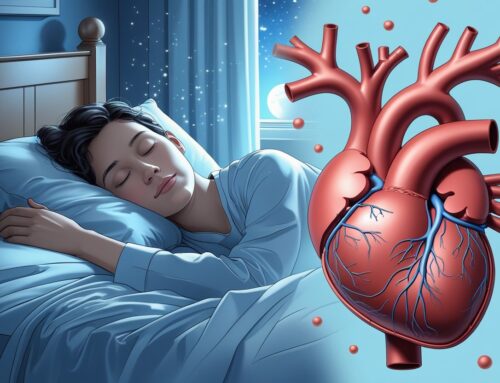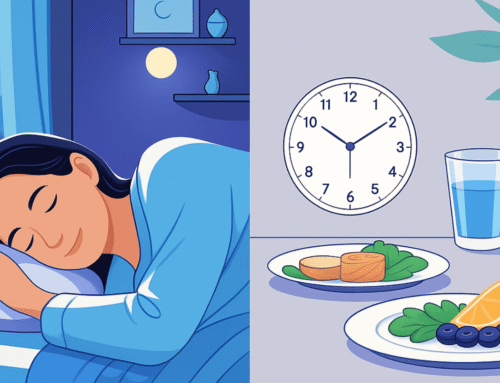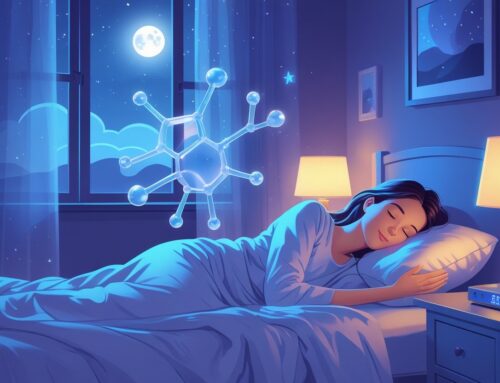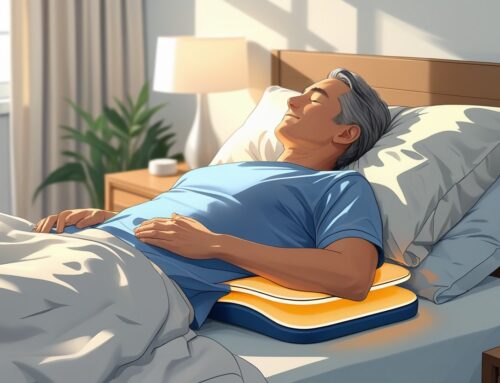Many people don’t realize how much hydration affects sleep quality. Staying hydrated helps the body keep balance and supports key sleep stages like REM. Dehydration can cause dry mouth, cramps, and trouble falling or staying asleep. Sleep and hydration connect in ways beyond just drinking water before bed. The body loses water during sleep through breathing and sweating. Low fluid intake can lead to mild dehydration. Drinking enough at the right times can help you sleep without waking up for the bathroom.
Knowing how hydration affects sleep helps people make smarter choices for rest. Watching how much you drink, when you drink, and spotting dehydration signs can improve sleep and overall health.
Key Takeaways
- Proper hydration supports deeper, more efficient sleep stages.
- Fluid balance during sleep is affected by natural body water loss.
- Timing and amount of water intake influence sleep quality and comfort.
- The right mattress helps your body stay cool, supported, and hydrated through the night by allowing airflow, reducing heat buildup, and promoting deeper, uninterrupted sleep.
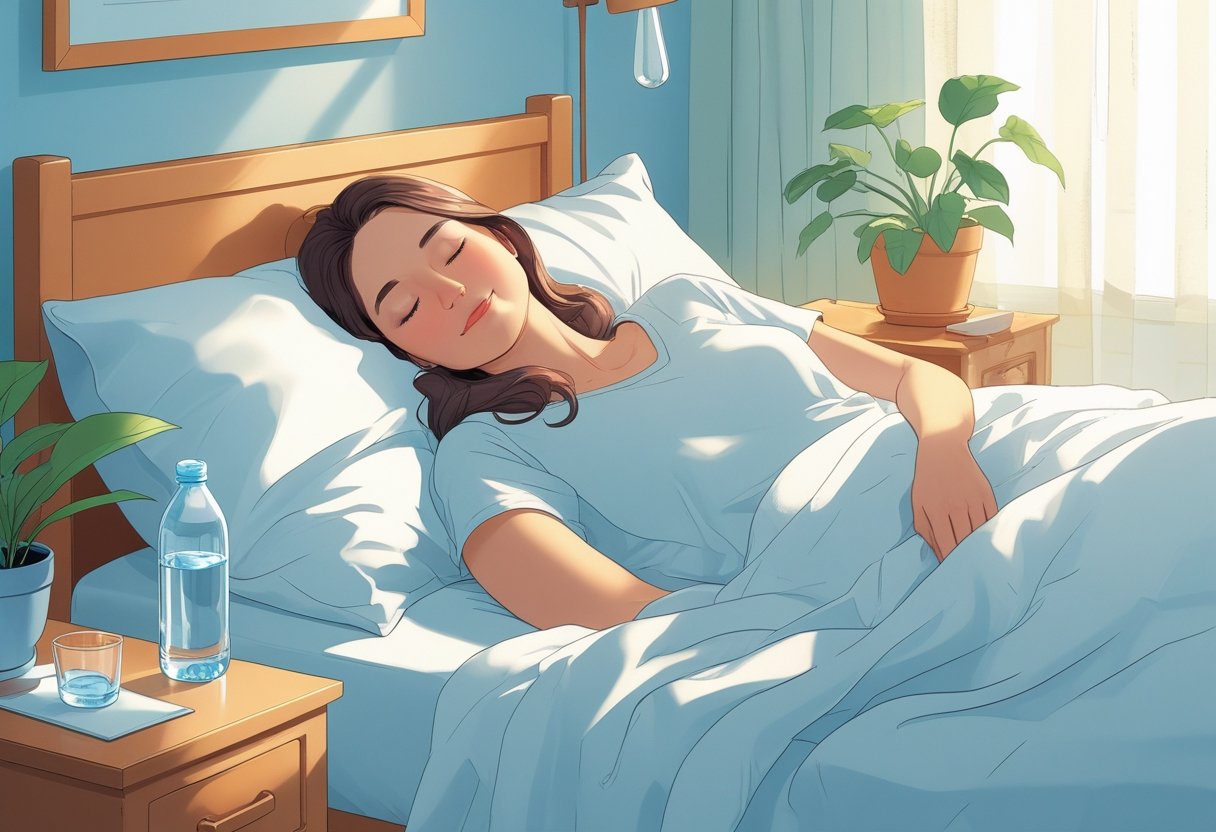
The Connection Between Hydration and Sleep
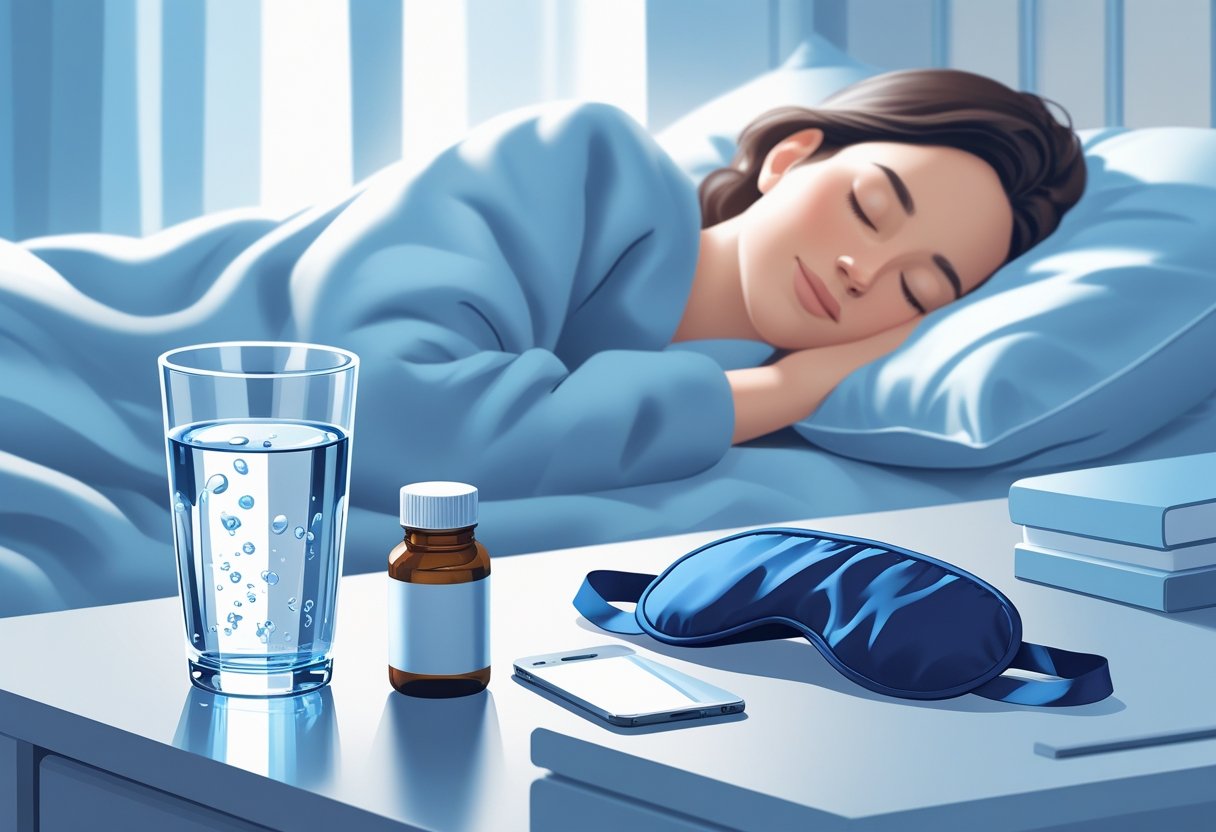
Hydration is important in maintaining bodily functions that support restful sleep. Clear links exist between how much water a person drinks and how well they sleep. Understanding these links shows why staying hydrated can affect sleep, fluid balance, and hormone control.
How Hydration Affects Sleep Quality
Water intake affects many body functions that influence sleep. Dehydration can make it harder for the body to regulate temperature, which can lead to tossing and turning. Even small fluid deficits can reduce REM sleep, which is important for memory and brain activity.
The amount of time actually spent sleeping while in bed can drop when hydration is low. Drinking too little water can shorten overall sleep. Mild dehydration may not disturb sleep in everyone, but it can make symptoms worse for people who already struggle with insomnia. Keeping hydrated helps the body remove waste and maintain mineral balance. These processes help the body relax and move into deeper stages of sleep. Drinking water consistently throughout the day gives the body the support it needs to sleep soundly.
How Sleep Influences Hydration Status
Sleep affects hydration through hormones that control fluid and urine production. During deep sleep, the hormone vasopressin increases. Vasopressin signals the kidneys to retain water, which reduces bathroom trips at night.
When sleep is poor, this hormone pattern can be disrupted. People may wake up more often to urinate and risk becoming dehydrated. Insomnia can also dull the feeling of thirst, so a person may not drink enough. Not sleeping well can also affect drinking habits. Fatigue may reduce motivation to drink water, and poor sleep can increase caffeine or sugary drink consumption, which lowers hydration. Solid sleep helps keep hormone levels steady and supports normal fluid intake.
The Role of Hormones in Fluid Balance
Hormones regulate both sleep and hydration. Vasopressin rises at night to help retain water, supporting uninterrupted sleep.
Cortisol, a stress hormone, can affect water balance too. Higher cortisol can increase urine production and disturb sleep cycles. Poor sleep and stress can shift hormone patterns, which can interfere with hydration. Aldosterone helps the body hold onto sodium and water, keeping blood pressure stable at night. Its levels change depending on sleep and hydration. Together, these hormones manage water retention and loss. Getting enough sleep keeps these systems working correctly, which helps prevent dehydration from affecting rest.
Signs and Symptoms of Dehydration During Sleep
Dehydration during sleep can cause several noticeable symptoms. It affects the body in ways that may disrupt rest and leave a person feeling uncomfortable both during the night and upon waking.
Recognizing Nocturnal Dehydration Symptoms
During sleep, dehydration can make the mouth dry, which can make it uncomfortable or hard to fall back asleep. Breathing through the mouth may add to the dryness. Sweating a lot at night or waking up to urinate can also point to dehydration.
Leg cramps can appear suddenly and wake someone up. These cramps are linked to fluid loss in the body. Headaches may show up too, which can affect how well someone sleeps. These signs are not always obvious but can disturb rest.
Morning Indicators of Dehydration
Waking up thirsty or with a dry mouth is a clear sign of dehydration. Dark or strong-smelling urine can also indicate fluid loss. Fatigue and trouble concentrating in the morning can happen after losing fluids overnight.
Headaches or feeling lightheaded may occur if dehydration is stronger. Skin or throat dryness can be noticed in the morning, especially in a dry room or if little fluid was taken before bed.
Common Discomforts Linked to Sleep Dehydration
Headaches and muscle cramps are common discomforts caused by sleep dehydration. These can wake someone up more often and lower overall sleep quality. Interrupted sleep can affect how the body manages fluids, which may worsen dehydration. Dehydration can also worsen conditions like sleep apnea or lead to night sweats, causing more fluid loss. Avoiding large drinks right before bed can help reduce bathroom trips and the risk of dehydration at night.
Keeping up good hydration during the day can prevent many of these problems and support a calmer, more restful sleep. For more details on dehydration and sleep, see hydration and sleep effects.
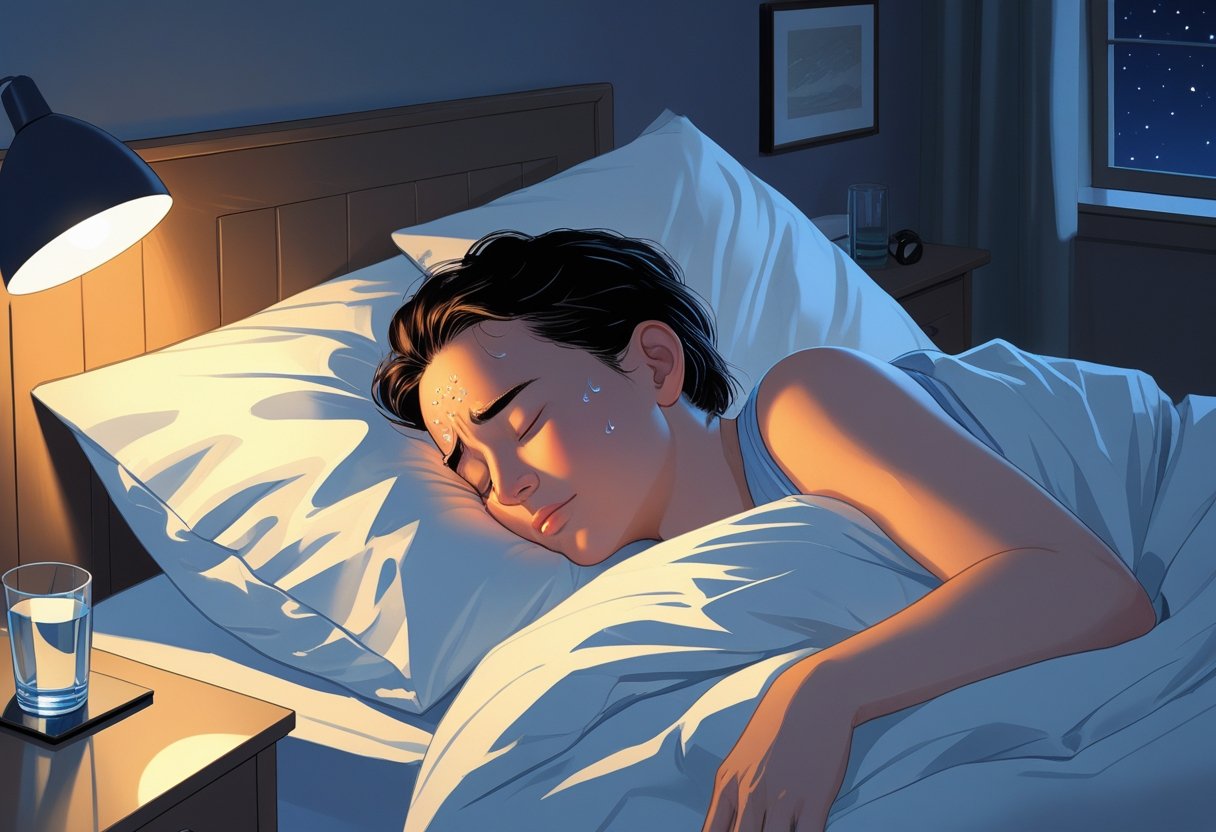
How the Body Loses Water While Sleeping
The body loses water during sleep in several ways, even if a person does not drink any fluids. This water loss can add up and contribute to feeling dehydrated upon waking. Understanding where this loss happens helps explain why staying hydrated during the day is important.
Fluid Loss Through Breathing and Sweat
Water leaves the body when we breathe. Moisture in exhaled air adds up over hours of sleep. This is called insensible fluid loss. People can lose around 300-400 milliliters of water just by breathing at night. Breathing through the mouth increases this loss. That is why waking up with a dry mouth is common for some people.
Sweating also removes water from the body. Night sweats, whether caused by heat or certain health conditions, can increase this loss. Even small amounts of sweat lower hydration levels. Sleeping in a cool room and wearing light pajamas can help reduce sweating and keep water levels steadier.
Nighttime Urination and Its Causes
Urination accounts for the largest water loss during sleep. Normally, the body produces less urine at night. But some factors can increase how often someone urinates.
Caffeine and alcohol before bed make the kidneys produce more urine. Certain medications and medical conditions also affect urine production. Aging can increase nighttime trips to the bathroom. Swelling in the legs can push fluid back into the bloodstream when lying down, which leads to more urine. Elevating the legs during the day can reduce this effect. Frequent bathroom trips can interrupt sleep, so managing fluids, timing, and health concerns helps improve rest.
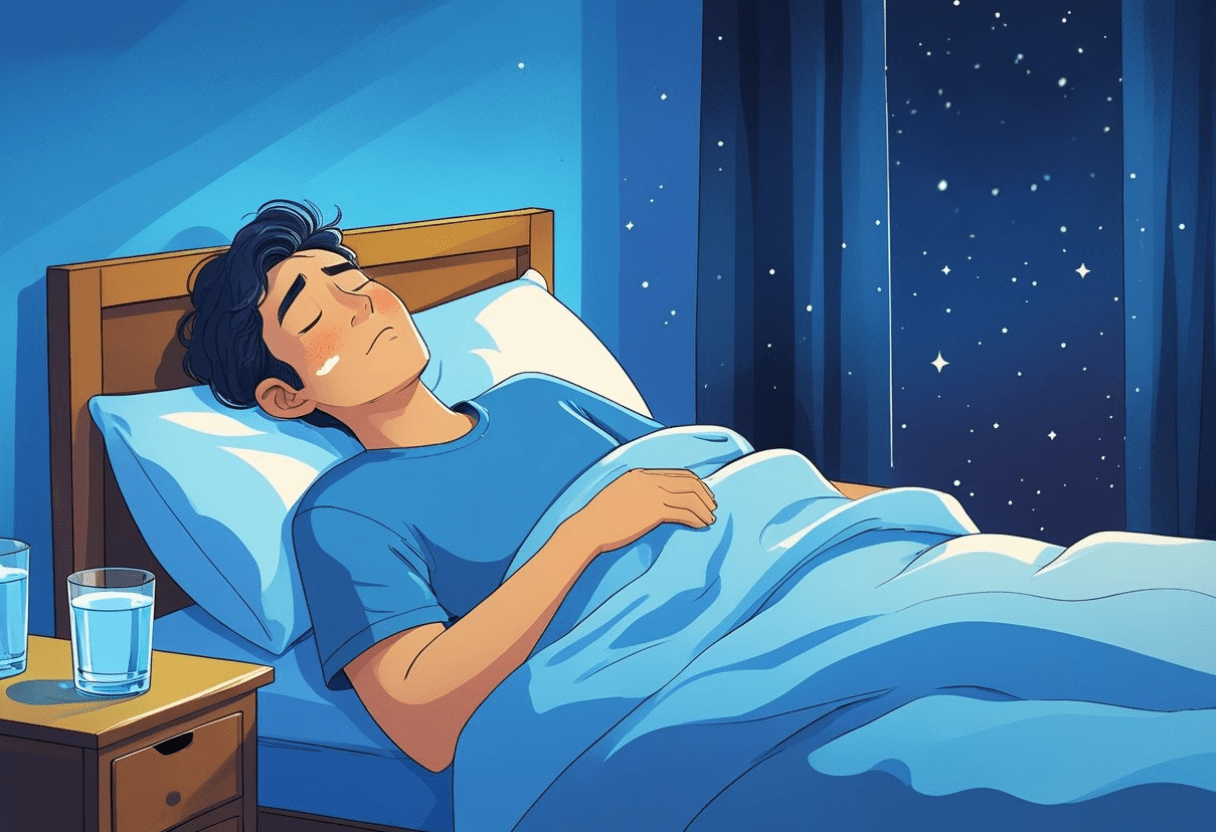
Factors That Increase Risk of Sleep-Related Dehydration
Certain groups and habits raise the chance of becoming dehydrated during sleep. Health conditions, medications, and lifestyle choices can all influence how well the body retains water overnight.
Age and Health-Related Risks
Older adults can get dehydrated at night more easily because their sense of thirst weakens. This can make it hard to drink enough water during the day. Chronic illnesses like diabetes or kidney problems affect how the body keeps fluids balanced. People with these conditions may take medications like diuretics, which increase urine output and can cause fluid loss before or during sleep.
Those with these factors should watch their hydration. Dehydration can make sleep less restful and cause issues such as dry mouth or leg cramps.
Environmental and Lifestyle Contributors
Dry air or a warm bedroom can make the body lose extra water through sweating and breathing. This adds to the risk of dehydration at night.
Certain habits can make dehydration more likely. Exercising right before bed raises body temperature and causes sweating. Without replacing fluids, this can lead to dehydration. Alcohol before sleep also increases fluid loss because it acts as a diuretic. It can disrupt sleep and cause frequent trips to the bathroom. Limiting alcohol late at night and drinking enough water during the day can help prevent these problems.
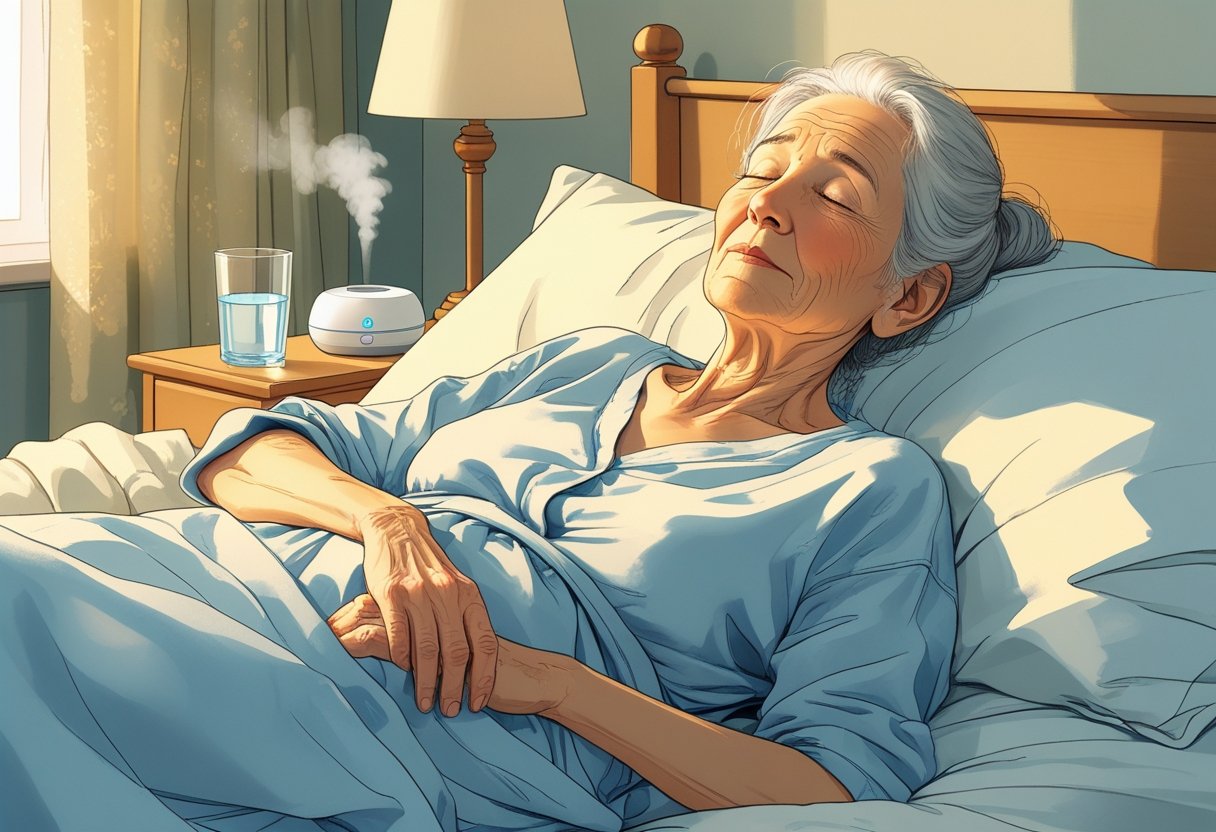
Impacts of Dehydration on Sleep Disorders

Not drinking enough water can quietly mess with your sleep. When your body doesn’t have enough fluids, it can affect how you fall asleep and how deeply you rest. You might find yourself waking up more, feeling uncomfortable, or tossing and turning through the night without knowing why.
Dehydration and Insomnia
Going to bed dehydrated can trigger small but irritating issues, like a dry mouth, a dull headache, or leg cramps, that keep you from relaxing. These symptoms make it harder to drift off or stay asleep. Even if you manage to sleep longer, it may not feel refreshing because your body isn’t fully at ease.
When you’re short on fluids, your muscles don’t relax as easily and your mind stays more alert. That delay in winding down can stretch out the time it takes to fall asleep. Studies suggest that mild dehydration can leave you more tired at night but less able to rest properly. Staying hydrated helps your body settle and makes it easier to slip into a steady, peaceful sleep.
Effects on Sleep Apnea and Nightmares
Lack of water can also worsen certain sleep disorders. For people with sleep apnea, dehydration can dry out the throat and nasal passages, making it harder to breathe comfortably. Thicker mucus can lead to more blockages, which may cause snoring, gasping, or waking up suddenly. It might also affect dreams. When your body feels under stress from dehydration, your sleep cycles can get disrupted. This may trigger more vivid or unsettling dreams, though researchers are still studying this connection.
Whether it’s sleep apnea, nightmares, or just poor-quality rest, dehydration doesn’t help. Drinking enough water throughout the day supports easier breathing and steadier sleep, helping you wake up feeling more rested and clear-headed.
Optimal Hydration Strategies for Better Sleep
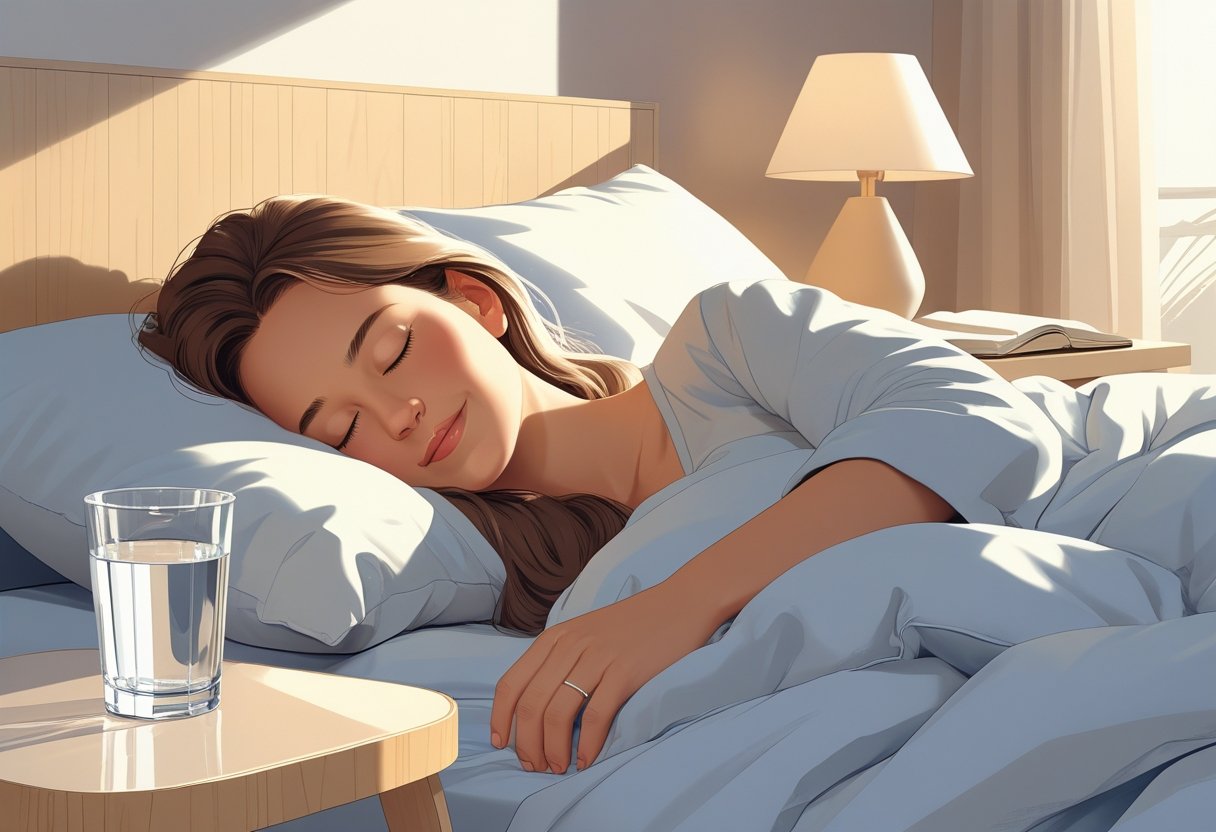
Staying well-hydrated supports better sleep without causing frequent bathroom trips. Managing fluids during the day and before bedtime helps prevent dehydration and reduces sleep interruptions. The kind of drinks and foods you choose also matters for keeping hydration balanced through the night.
How to Stay Hydrated Overnight
The best way to stay hydrated at night is to build up fluids during the day instead of drinking a lot before bed. Drinking enough water throughout the day keeps your body balanced and prevents waking up thirsty.
A small glass of water about an hour before bed can help, but too much can lead to bathroom trips in the middle of the night. During sleep, your body releases hormones that help keep water levels steady. But if you go to bed already dehydrated, you might wake up with a dry mouth or a headache.
Balancing Fluid Intake and Nighttime Awakening
It’s good to drink plenty during the day but limit fluids in the two hours before bedtime. This simple habit helps prevent waking up to pee, which can break your sleep cycle.
Caffeine and alcohol can both trigger more urine production and disturb your rest. Try to stop caffeine at least eight hours before sleep and alcohol three hours before. It also helps to use the bathroom before lying down so you can rest without interruptions.
Preventing Dehydration During Sleep
To prevent dehydration at night, keep your room cool and use lighter bedding. This reduces sweating and helps your body hold on to more water.
If you still wake up dehydrated even after drinking enough, it might be worth checking with a doctor. Some medications or health conditions can cause extra fluid loss. Keeping a steady sleep schedule also helps your body manage hydration better.
Avoid eating salty or high-protein meals late in the evening since they can increase urine output. Staying hydrated at night is about being mindful of what and when you drink so your body rests well and stays balanced.
Timing and Amount of Fluid Intake Before Bed
The balance between staying hydrated and avoiding sleep interruptions depends on timing and the amount of water consumed before bed. Drinking too much close to bedtime can cause trips to the bathroom at night, while drinking too little can leave the body dehydrated. Finding a middle ground is key for a full night’s rest.
When to Stop Drinking Water Before Bed
Experts suggest stopping water intake around 2 to 3 hours before going to bed. This gives the body enough time to handle fluids and empty the bladder before sleep. Doing this helps prevent waking up in the middle of the night to use the bathroom.
Waking up several times to urinate, known as nocturia, can interrupt deep sleep and leave you tired the next day. People with kidney problems or those taking water pills need to be extra careful about their evening water intake. It also helps to skip caffeine and alcohol at night since they cause more urine production. Paying attention to your body’s thirst cues matters, but timing water properly makes a big difference in getting uninterrupted rest. More details on this topic are available from the Sleep Foundation.
How Much Water to Drink in the Evening
If you’re thirsty before bed, a small glass of water is okay. The idea is to stay hydrated without filling the bladder too much.
Adults usually need about 2.5 to 4.5 liters of water daily, depending on body size and activity level. Try to keep the evening water intake light. Drinking too much before sleep increases the chances of waking up in the middle of the night. Avoiding salty, spicy, or sweet foods late at night can help control thirst and limit the need for extra water. A cool bedroom can also help prevent sweating and fluid loss.
Staying hydrated during the day is the best way to avoid drinking too much at night. Tracking how much water you drink in the evening may also help if you have trouble sleeping.
How Your Mattress Affects Sleep and Hydration
The mattress you sleep on can affect your comfort, rest, and how your body stays hydrated through the night. It influences temperature control and how well moisture moves away from your skin. When a mattress traps heat, it can cause night sweats. That fluid loss may lead to mild dehydration by morning. Choosing one that allows good airflow helps prevent this. Materials that breathe well let your body stay cooler and more comfortable while you sleep.
A mattress that supports your body properly also helps you reach deeper sleep stages, including REM. These stages are important because they help balance hormones that manage water levels. Poor support can lead to tossing and turning, which may interrupt these processes.
Key mattress features to consider:
- Breathable materials like latex or gel-infused memory foam
- Cooling covers that pull moisture away from the skin
- Firmness that matches your body shape to reduce pressure
Getting consistent, deep rest helps your body stay hydrated by preventing sleep disruptions. The Brooklyn Bedding Aurora Luxe Mattress is a strong option for this. It’s built with advanced cooling materials and comes in multiple firmness levels to fit different needs.
The Brooklyn Bedding Aurora Luxe Mattress combines CopperFlex foam, TitanCool technology, and individually encased coils for a cool, balanced feel. The foam keeps the surface comfortable, while the coils promote airflow underneath. This combination helps prevent overheating and keeps you comfortable through the night, supporting both restful sleep and hydration.

Frequently Asked Questions
Good hydration directly affects the quality and length of a person’s sleep. The kind and amount of fluids you drink before bed can affect your rest. Some drinks can interrupt sleep, while others can help you relax and stay asleep. If you wake up with a dry mouth or muscle cramps, it might be a sign that your body needs more water.

